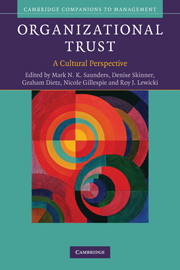Book contents
- Frontmatter
- Contents
- List of figures
- List of tables
- Note on editors
- Note on contributors
- Foreword
- Editors' acknowledgements
- Part I The conceptual challenge of researching trust across different ‘cultural spheres’
- Part II Trust across different ‘cultural spheres’: inter-organizational studies
- 5 Examining the relationship between trust and culture in the consultant–client relationship
- 6 Checking, not trusting: trust, distrust and cultural experience in the auditing profession
- 7 Trust barriers in cross-cultural negotiations: a social psychological analysis
- 8 Trust development in German–Ukrainian business relationships: dealing with cultural differences in an uncertain institutional context
- 9 Culture and trust in contractual relationships: a French–Lebanese cooperation
- 10 Evolving institutions of trust: personalized and institutional bases of trust in Nigerian and Ghanaian food trading
- Part III Trust across different ‘cultural spheres’: intra-organizational studies
- Part IV Conclusions and ways forward
- Index
- References
10 - Evolving institutions of trust: personalized and institutional bases of trust in Nigerian and Ghanaian food trading
Published online by Cambridge University Press: 05 June 2012
- Frontmatter
- Contents
- List of figures
- List of tables
- Note on editors
- Note on contributors
- Foreword
- Editors' acknowledgements
- Part I The conceptual challenge of researching trust across different ‘cultural spheres’
- Part II Trust across different ‘cultural spheres’: inter-organizational studies
- 5 Examining the relationship between trust and culture in the consultant–client relationship
- 6 Checking, not trusting: trust, distrust and cultural experience in the auditing profession
- 7 Trust barriers in cross-cultural negotiations: a social psychological analysis
- 8 Trust development in German–Ukrainian business relationships: dealing with cultural differences in an uncertain institutional context
- 9 Culture and trust in contractual relationships: a French–Lebanese cooperation
- 10 Evolving institutions of trust: personalized and institutional bases of trust in Nigerian and Ghanaian food trading
- Part III Trust across different ‘cultural spheres’: intra-organizational studies
- Part IV Conclusions and ways forward
- Index
- References
Summary
Summary
This chapter examines the processes of building cooperation in a context of sparse public-sector regulation. The Nigerian and Ghanaian food sectors are characterized by a highly dispersed and fragmented system of micro-entrepreneurs from diverse ethnic groups who both compete and cooperate in order to flourish. Drawing on ethnographic research, we consider the relationships and contracts that require an element of cross-cultural trust, how personal social relations and institutional forms are used to ensure trust and the role of cultural norms. Our empirical findings indicate that individuals draw on both personalized social relations and institutional forms of trust that are underpinned by culture-specific norms. Through personalized trust, traders have been able to operate across cultural boundaries, building common norms of behaviour over centuries, and shaping these into what are perceived essentially as professional, albeit personalized, codes of conduct and semi-formal institutional forms (such as associations) that function in parallel to the state.
Introduction
The Nigerian and Ghanaian food sectors are characterized by a highly dispersed and fragmented system of micro-entrepreneurs from a range of ethnic groups who both compete and cooperate in order to survive and grow. The fragmented nature of the sector necessitates a range of cooperative forms in order for the enterprises to gain access to information, finance, quality products and market spaces. The traders involved are found to have a number of different types of bilateral relations (joint ventures and informal reciprocal arrangements) both within cultural groups and crossing cultural boundaries.
- Type
- Chapter
- Information
- Organizational TrustA Cultural Perspective, pp. 255 - 278Publisher: Cambridge University PressPrint publication year: 2010
References
- 10
- Cited by

